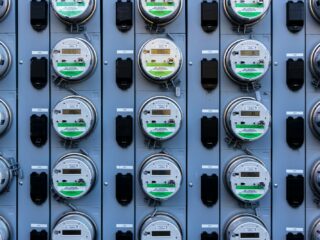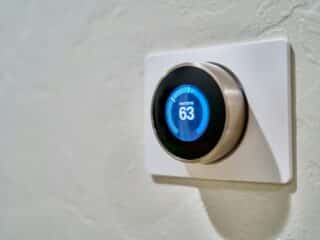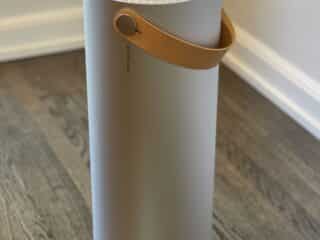
The Filter Is Dirty
Image via Flickr by Mike Linksvayer
The leading cause of HVAC-related illness is a dirty filter. More than just dust accumulates in the filter – it can become a breeding ground for bacteria, black mold, and other fungi. These in turn can cause symptoms such as breathing problems ranging from asthma to Legionnaires’ Disease, a potential fatal form of pneumonia. To fix a dirty filter, replace it with a clean one at least once every three months, and more frequently if you live in an environment with excess hair, pets, and smoke.
There Is Poor Air Circulation
The more time you spend in an air-conditioned space, the dryer your skin could become. This can be due to poor temperature control (more on that in a bit), but also poor ventilation. Simply put, air needs to circulate or it becomes stale and dries out your skin, which can be a problem for people with eczema or psoriasis. Consider adding a humidifier if your HVAC unit doesn’t have one, and drink plenty of water. To soothe irritated skin, try a moisturizer.
It’s Too Cold
Have you ever heard of “sick building syndrome”? According to the International Journal of Epidemiology, people who worked in a building with central air conditioning were more likely to show symptoms of an illness, such as headaches or fatigue, than people who worked in naturally maintained environments. In addition, Oxford Journals reports that people who spend a lot of time inside need more healthcare for a cold than those who don’t. Both of these problems can be traced to the HVAC not keeping a set temperature, such as being too cold. If turning up the thermostat doesn’t solve the problem, it might be time to call an HVAC technician.
There Are Holes in the Ductwork
If your allergies are suddenly giving you trouble, you might want to check the ductwork. Holes can allow unfiltered air into your house, and this can cause runny nose or itchy, watery eyes. Holes in the ductwork also allow small animals such as mice to get into the ducts, and this can be a problem for people with allergies to animal dander.
The air you breathe is vital to your health, so if you suddenly feel sick for no apparent reason, you may want to call an HVAC technician. Remember, it’s not always dry eyes, runny nose, and sneezing that manifest. Other causes of HVAC-related health problems include hypertension and weight gain. To prevent these problems, you should have your HVAC system serviced at least once a year and whenever you suspect there’s a problem with your unit.







7 comments
Yes, such a thing as a dirty air filter can cause many problems.
If you don’t know how to replace filters, check out our DIY guide: https://servicetoday247.com/diy-guide-how-to-change-air-filter-for-winter/.
Thank you for sharing this! Regular HVAC maintenance is important, regardless of what kind of building it is. We created a seasonal guide to HVAC maintenance: https://happyhiller.com/blog/seasonal-guide-to-hvac-maintenance-introduction/. Just print and use it all year round! 🙂
While HVAC maintanance can prevent many problems, you should also remember that over time all the appliances get old and need replacement. In this case, just routine maintenance may be not enough.
Here are some signs you need to replace your HVAC system: https://polestarplumbing.com/news-media/take-advantage-this-fall-the-best-season-for-heater-replacement.
Thank you for sharing this! Winter is not that far off, which means that very soon we will remember about our furnaces, heaters and boilers – everything that warms us on cold winter days. In order for your heating to work efficiently and smoothly, don’t forget to carry out annual maintenance. Here are a few important checks that you or service technician should perform to help your system run like new: https://www.gervaismechanical.com/34013-2/.
Right, adding a humidifier is a sure way to increase humidity in your home.
But here are some other simple things you can do for this: https://www.sandersandjohnson.com/4-ways-increase-humidity-home/.
It’s important to know. Thank you for sharing!
As a part of HVAC maintenance, you should also clean your HVAC items by vacuuming inside and around every month. This is especially true for furnaces. By doing this, you help your system work more efficiently and also improve fire safety. The thing is, dust can be highly flammable, and it only takes a small spark to set this off.
A piece of advice: for wall furnaces, clean inside the burner compartments. Clean this area at least once a month during winter to avoid lint buildup. For natural gas furnaces, the flame should burn blue. Orange or yellow flames may mean your furnace needs cleaning or adjusting by a professional.
If you’re looking to improve air quality in your home, you should use the type of filter that suits your home conditions. Pleated filters with MERV rating are a good filtration option. The higher the rating, the better filtration. But even though the filters with higher MERV ratings are more capable of capturing the smaller particles, it has some negative side as well. The highly-rated filters have smaller pores for air flow. This in turn creates more resistance to the system than it is designed to manage, leading to a negative impact on the efficiency of the system.
According to this article https://escoutah.com/breathe-easy-tips-improve-indoor-air-quality/, a pleated filter with a MERV rating in the 7 to 12 range would be enough for residential buildings, including homes with allergy or asthma sufferers